France is set to become the 14th country worldwide - and the ninth in Europe - to open up marriage to homosexual couples after its parliament on Tuesday voted in favour of a bill of law to give marriage and adoption rights to couples of the same sex.
The final vote in the lower house, the National Assembly, and which followed the bill’s adoption by the Senate, resulted in 331 Members of Parliament in favour and 221 against. It came after some 200 hours of parliamentary debate and about 60 hours of hearings.
“The first [gay] marriages could happen during June this year,” announced French justice minister Christiane Taubira, speaking shortly after the vote. "We believe that the first weddings will be beautiful and that they'll bring a breeze of joy, and that those who are opposed to them today will surely be confounded when they are overcome with the happiness of the newlyweds and the families," she said.
It now remains for the socialist government to enact the law, while a group of conservative opposition MPs, whose UMP party has campaigned against the bill, have promised to contest it before France’s Constitutional Council.
While the outcome of the vote on Tuesday was expected, it is unlikely to put a swift end to a climate of tension around the country between those for and against the law. Hundreds of thousands of anti-gay marriage protestors have taken to the streets in repeated demonstrations since last autumn in an often ferocious campaign against the bill, over which recent opinion surveys show public opinion to be broadly divided in two.
The demonstrations have been marred by violence perpetrated by far-right gangs joining the marches, and a rising number of homophobic attacks have been recently reported nationwide as political rhetoric against the bill has spun into occasional hysteria. In one incident among several rowdy debates in the National Assembly, UMP opposition party MP Philippe Cochet last week accused the government of “assassinating children” with its proposed law.
On Monday, the socialist president - or speaker - of the Assembly, Claude Bartelone, received a threatening letter, containing gunpowder, summoning him to postpone Tuesday’s vote on the bill. “I am very worried about the general atmosphere, several amongst us are directly aimed at, targeted,” commented justice minister Christiane Taubira. Gay rights associations, meanwhile, have denounced a sudden upsurge in open homophobic behaviour that is unprecedented in recent decades.
The nature of the controversy raised by the marriage law reform is comparable to those caused by the introduction of the right to abortion and the abolition of the death penalty. Opponents of the law have vowed to continue demonstrating, with the next rally called for May 5th.
The protest movement’s leadership is a broad alliance of Catholic militants and the conservative opposition, but also includes the far-right National Front party, one of whose MPs, Gilbert Collard, joined with mainstream conservative politicians in a march through Paris on Sunday, when opponents and supporters of the bill held separate demonstrations ahead of Tuesday’s vote in the National Assembly.
Mediapart reporters took to the streets with both, and the opinions expressed by those taking part reveal apparently irreconcilable views over the issue, while many gays spoke of their indignation and fear over the upsurge in insults and violence they have personally witnessed since last autumn.
The anti-gay marriage protestors on Sunday, who marched two and a half miles to the Esplanade des Invalides in the centre of the capital, claimed a turnout of 270,000 – while police estimates reported the number at 45,000. Supporters of the bill who staged a counter demonstration several miles away across the River Seine at the Place de la Bastille claimed a turnout of 15,000, estimated by police to number 3,500.
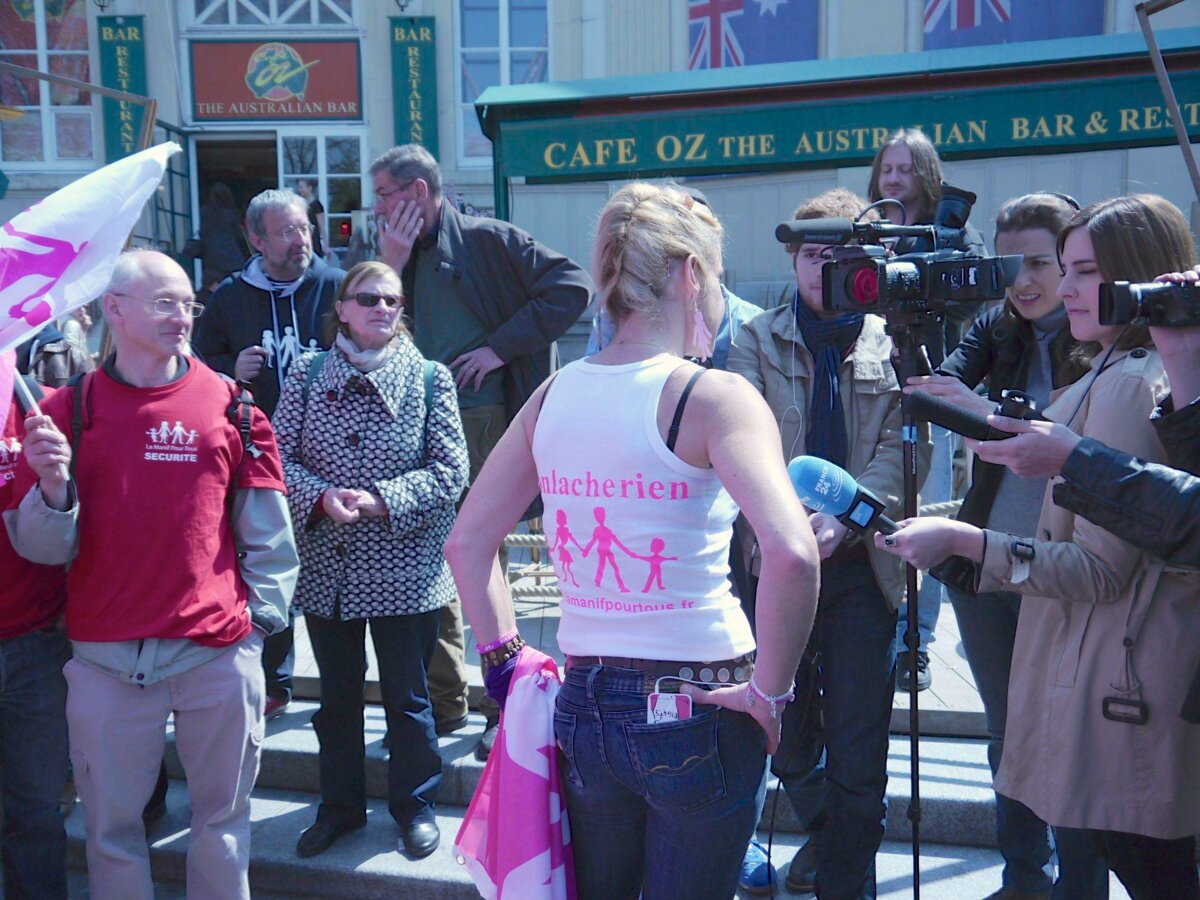
Enlargement : Illustration 1

Virginie Tellenne, a 50 year-old one-time comedian and actress who is more widely known by her stage name of Frigide Barjot (a play on the name of former cinema star Brigitte Bardot, and roughly meaning ‘frigid madwoman’), has become the spokeswoman of the anti-gay marriage movement. On Sunday, as the demonstrators gathered at the departure point at the Denfert-Rochereau square, she claimed the protest movement was “neither Right, nor Left, but for humanity” and announced that her anti-gay marriage movement will present candidates in nationwide municipal elections to be held in France in 2014.
“These last hours have given place to much violence,” she told a crowd of reporters. “Our combat is a request for debate.” As if to lend credence to her claim that the movement she leads is apolitical, she presented Joseph Thouvenel, vice-president of the Catholic trade union, the CFTC, who told the press of his indignation at a law that would “prohibit children from having a father and a mother”. He was followed by an official from the left-wing CGT union, one of the largest trade unions in France once closely affiliated to the Communist Party, who said he was “shocked to see how this demonstration is associated on news programmes with extremists”, referring to its far-right supporters. “I am a Marxist, he said, “to be a revolutionary is to denounce this bill.”
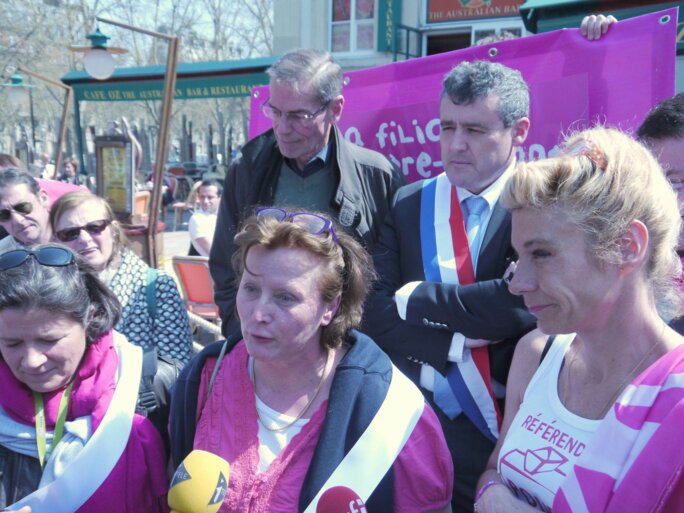
Enlargement : Illustration 2

Barjot was then joined by a middle-aged woman whom she introduced as “a mother”, and representative of the movement’s supporters. “It’s time for mums to rise up,” the woman said. “We are going to set up a [human] chain, relaying each other every 24 hours. And if Hollande doesn’t listen to us, we’ll take it, if needed, to a hunger strike.”
The march set off through the Montparnasse district, led by Barjot, to renditions of the Marseillaise, the French national anthem. Many of the demonstrators were young adults, including Nathalie (last name withheld), aged 23, a sociology student who had travelled from the northern French city of Lille “to denounce the LGBT lobby” and what she described as an “absurd” bill. "It is simply because the gays are close to the Left, which is in power,” she added. “It’s not even a question of MAP [medically-assisted procreation] or anything. Me, I would not have liked to have had but two dads, or two mums.”
'Breaking the yoke of the ideology of May 1968'
Monique (last name withheld) was holding, like many on the march, a banner with the slogan ‘All born from a man and a woman’. The 56 year-old, a former insurance company employee who has been unemployed for the past three years, said she had voted for François Hollande in last year’s presidential elections. “This law only serves to create orphans,” she commented. “Hollande promised to combat [the world of] finance, that’s why I voted for him, not for this awful text. I won’t be had another time.”
Another of the demonstrators was Nabib (last name withheld), who had travelled to Paris with his family and friends from the town of Rennes, in western France, and who carried a banner reading ‘Muslims of France will never accept that’. “I am French, I fight for France, for the family,” he said. “A family is a father, a mother. And I can tell you that all Muslims, or rather the true Muslims, those who practice, are against this law.” Asked why there were so few Muslims among the crowd, he replied: “They’ve been had, manipulated by the Left. But at their hearts they are with us.”
A manager with a bank, Jean (last name withheld), 39, said he had taken part in all the anti-gay marriage demonstrations since last autumn, although he had never joined a public protest since his teenage years. He said he will continue to oppose the bill, even if it becomes law. “I am not against the marriage of homosexuals, but against plenary adoption,” he explained, adding that there was a need “to put values back into the heart of our society and politics”.
“Man cannot be all-powerful,” he said. “Nature is sexual.”
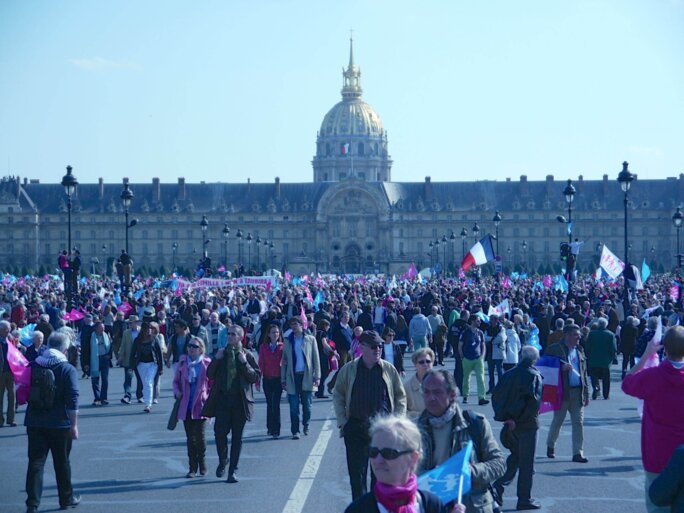
Enlargement : Illustration 3

Anne-Sophie (last name withheld), 27, who said she is against both same-sex marriage and the right for gay married couples to adopt children, joined the march to “defend the children who cannot express their views”. She complained that the government had been “totally deaf” to opponents of gay marriage. “It’s all the same worth launching a debate,” she said.
Serge (last name withheld) is a 66 year-old pensioner and a member of the UMP conservative opposition party. “It is quite simply an absurd and ideological bill,” he said. “We shouldn’t even be talking about it, it’s a non-subject for me. In any case, it’s not worth turning France upside down for that. The current [parliamentary] majority is manipulated by a minority of Trotskyists whose aim is to destroy the family cell. We’ll see that with the other bills to come concerning the family. There have to be people who say no, to get away from the politically correct.”
“All of that is happening within an environment where people are in despair,” he continued. We’re living through an economic shock, the euro will disappear within five years and in 50 years we’ll be having a civil war with the Muslims. And faced with all that, the UMP is today flat on the ground and inaudible.”
The demonstration ended with a rally at the Esplanade des Invalides, close to the Eiffel Tower, where a speaker congratulated the crowd for “breaking the yoke of the ideology of May '68”, referring to the student-led leftist protest movement of 1968. Frigide Bardot then took to the stage to mass applause, presenting the conservative politicians Henri Guaino, once advisor to former president Nicolas Sarkozy, and his fellow UMP party MP Hervé Mariton.
Guaino, who later dismissed the police estimates of the turnout as “a lie”, told the crowd “the people of France has stood up” and called on President François Hollande to “change or leave”. Mariton promised that if the Right was returned to power in legislative elections next due in 2017 “we must go back on this [law]” with a referendum “which will propose a contract of civil union".
'Without my faith I may have done the irreparable'
Across the river, at the Place de la Bastille, a traditional gathering venue for the Left, a counter rally was held Sunday in support of the bill organised by Act Up and several LBGT associations. Among politicians present were the socialist mayor of Paris Bertrand Delanoë, Socialist Party spokesman David Assouline, and Party of the Left leader Jean-Luc Mélenchon.
Also present was Jean-Luc Romero, a former national secretary of the conservative UMP party, now a councillor for the Greater Paris Region and affiliated to the Socialist Party. Romero, 53, who, like Delanoë, has publicly declared his homosexuality, is a longstanding activist for gay rights. “I don’t recall [there being] such a climate of homophobia in our country,” he said. “But when some call for blood, we shouldn’t be surprised. This violence is theirs.”
Around the Bastille square, Act Up set up boards with photos of anti-gay marriage opponents, including Frigide Barjot and UMP party leader Jean-François Copé, entitled ‘Faces of hate’. Many among the several thousand present were there to denounce what they perceive as a rise of homophobia in France.
“This demo is good to have, things are moving at last,” said Matthias Perez, 29, a music teacher. “What we are hearing these days is insufferable. The egoism of these people who are opposed to a right is insufferable. At the same time, I say to myself that democracy is on our side. I have always known homophobia. But it is true that, at the moment, I notice an increase. “
“[…] I am a music teacher in a secondary school. In our establishment the pupils are obviously influenced by their parents, what they here in the evening at the dinner table. Some of the gay pupils who assume [their sexuality] pay a steep price at the moment. Their fellow classmates insult them, call them ‘queers’, tell them to ‘go and get buggered’. Others suffer in silence, and are sometimes failing at school because of that. With my colleagues, we try to talk to them. The sooner all that ends the better, even if the road to get there is a broken one, because [the question of] obtaining medically-assisted procreation for lesbians still remains.”
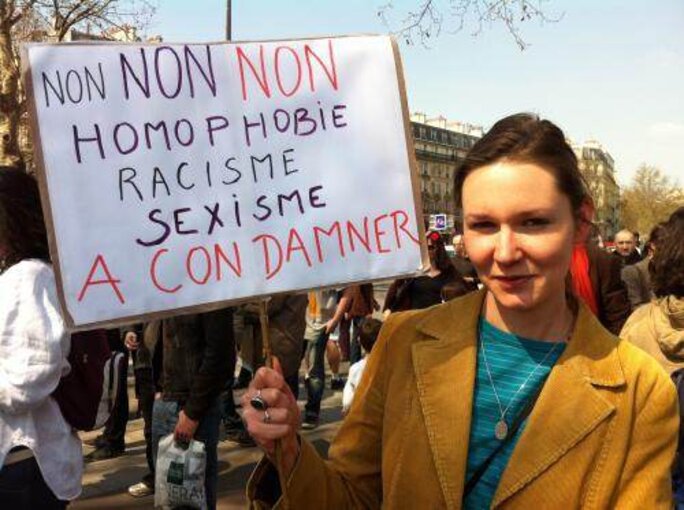
Claire Lesquoy, 29, a lesbian and a practicing Catholic, spoke of her despair at the attitude of the Church in France. “I am here because the marriage [law] is still not signed, because there is too much violence and hate,” she said. “It is an indescribable horror what we are hearing, Barjot who wants blood to flow. I feel like vomiting. I am gay and Catholic, I have the right to be respected, to love, to be happy, no? Last September I joined the Christian LGBT association David and Jonathan. It took me ten years to make the jump. But it was too hard for me to live with it in the church. Lately, mass systematically ends with calls to demonstrate against [the same-sex marriage bill]. I have been insulted and rebuffed. I have broken off with some people I knew. If I’m rejected, I’m not going to turn the other cheek either. There is a rise of extreme violence.
This year, I’m going to the [Catholic Church’s international] World Youth Days in Brazil. I’m going for myself, to meet believers, but I’m nervy. I took part in a preparatory meeting where lots of participants were clearly against marriage and adoption [rights] for homosexuals. If I didn’t have my faith, I wouldn’t be here, with my banners. I might have done something irreparable, like some young homos who are excluded by their parents, their communities and so on.”
'The debate brought to the fore what people kept secret'
Gay couple Gilles and Laurent (last names withheld), both 44, expressed their grave concern at what they see as a climate of homophobia unprecedented in recent decades in France. Gilles works with the French railways operator SNCF, Laurent is a nursing auxiliary. In their jobs and in the small town of Brou-sur-Chantereine, west of Paris, where they live they say they had never been targetted by homophobia until an incident on March 24th, the day when the hitherto largest anti-gay marriage demonstration was held. Gilles was inside his home when there was a knock at the door. He opened thinking it was Laurent. “It was a neighbour,” he recounted, “he called me an ‘arse hole’, a ‘queer’, I slammed the door shut.” They gave a statement to the local police station, but were told that there was an insufficient case for which to open an investigation.
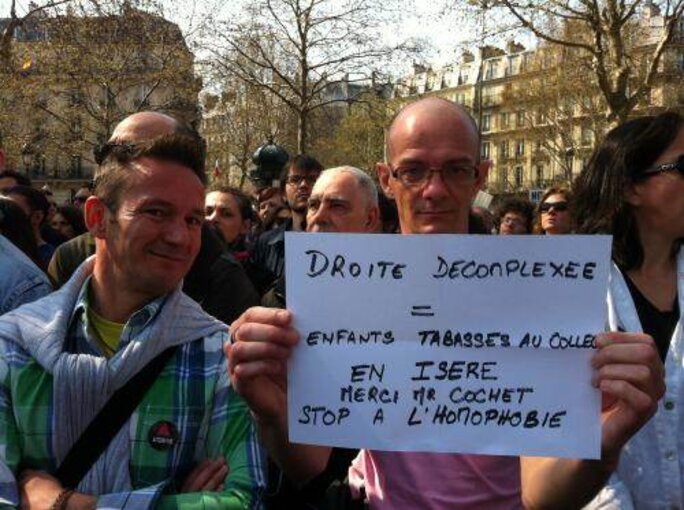
During the demonstration at the Place de la Bastille they carried a small banner denouncing the conservative UMP opposition party MP Philippe Cochet’s outburst that the same-sex marriage bill was tantamount to “assassinating children”, linking it with a vicious attack on two gay secondary school pupils by their classmates in south-east France last week. “All of that repulses me,” said Laurent. “I was attacked 20 years ago. Since 20 years ago, I have never seen such a climate of homophobia.” The pair said they hoped the tensions would drop after the law was voted, and in a few months, they vowed, “of course we’ll get married”.

Wrapped in a shawl of rainbow colours, Marie-Astrid Chevalier, a 19 year-old apprentice pastry maker, said her parents had lost friends because she is a lesbian. She lives close to the Invalides in central Paris where many of the anti-gay marriage demonstrations end in a rally. “Every evening I see these people demonstrating against my rights,” she said. “I am from a Catholic family, I’m a believer. But since six months ago I have left the Church. I’ve broken off. There have been lots of comments among my entourage. My parents have lost some friends who know that I am lesbian, [and] with whom there’ve been clashes. I get the impression that this debate has brought to the fore lots of things that people were keeping to themselves. Before, I used to get some looks when I was walking with my girlfriend, but these last months people speak out. I’ve heard ‘dirty dykes’. Even at work, since a few months, I sometimes here comments that unsettle me. I hope that once the bill is passed all that will stop.”
-------------------------
English version by Graham Tearse


